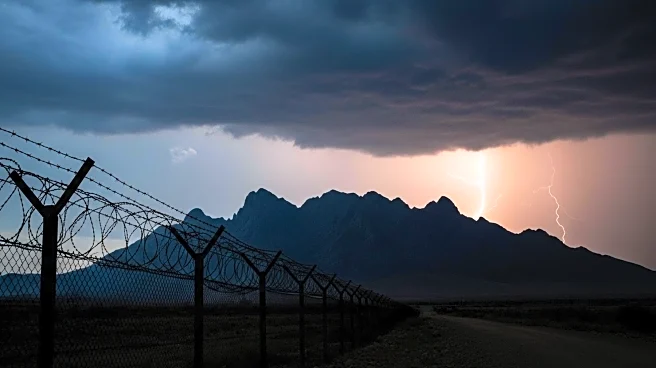What's Happening?
Recent cross-border clashes between Afghanistan and Pakistan have intensified, with Afghan officials claiming to have killed 58 Pakistani soldiers in retaliatory operations. Pakistan, however, reports a lower death toll of 23 and describes the attacks as unprovoked. The conflict centers around the Durand Line, a disputed border that Afghanistan has never recognized. The tension has disrupted the Torkham crossing, a crucial trade route, and raised concerns in the Gulf region, prompting calls for restraint from Saudi Arabia and Qatar. Afghan Foreign Minister Amir Khan Muttaqi, currently in India, denied Pakistan's accusations that the Taliban harbors members of the Tehreek-e-Taliban Pakistan (TTP), a banned militant group responsible for recent attacks in Pakistan.
Why It's Important?
The escalation of violence along the Durand Line highlights the fragile relationship between Afghanistan and Pakistan, with significant implications for regional security. The resurgence of the TTP poses a threat to Pakistan's internal stability, as the group aims to overthrow the government and impose its interpretation of Islamic law. The conflict disrupts trade and could lead to further instability in the region, affecting economic and political relations. Pakistan's historical support for the Taliban has backfired, as the Taliban now seeks legitimacy at home and distances itself from Pakistani influence. This shift in dynamics could alter power balances and alliances in South Asia.
What's Next?
Both Afghanistan and Pakistan remain locked in a cycle of provocation and denial, with neither side willing to take the necessary political or military steps for lasting peace. The situation demands diplomatic intervention to prevent further escalation and to address the underlying issues of militant support and border control. The international community, particularly neighboring countries, may need to mediate to ensure regional stability and security.
Beyond the Headlines
The conflict underscores the long-term consequences of Pakistan's strategy of using militant proxies for influence in Afghanistan. The very groups it once supported are now undermining its security, highlighting the risks of such policies. The situation also reflects broader geopolitical tensions in South Asia, where historical grievances and territorial disputes continue to fuel conflict.









